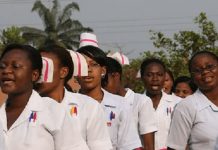… As FOLGONM holds 32nd annual scientific conference
Following the spate of emerging and re-emerging infectious diseases in the country, Head of Nursing Department, College of Medicine, University of Ibadan, Dr Olabisi Adejumo, has called on nurses to embrace health promotion in all ramifications.
Adejumo, who was the keynote speaker at the 2016 annual national scientific workshop of the Forum for Local Government Nurses and Midwives (FOLGONM), said emerging health issues can only be tackled effectively with health promotion.
Describing nursing as a profession with a rich history in health promotion, she noted that every nurse, health visitor or midwife can become a health-promoting practitioner, aside from working as a specialist public health professional.

The nursing expert who explained the importance of health promotion in the society noted that rarely does a week go by without a headline about the emergence or re-emergence of an infectious disease or other health threat somewhere in the world.
“Emerging and re-emerging health issues are very much with us in Nigeria. The rate of re-emergence of infectious diseases has been on the increase. Diseases such as cholera, tuberculosis, influenza (flu), hepatitis and staphylococcus infections, thought to have been controlled, are re-emerging”, she observed.
Clarifying the difference between health education and health promotion, Adejumo defined health education as the provision of health information, knowledge, and skills to individuals and communities, to enable them adopt healthy behaviours voluntarily; while health promotion takes a more comprehensive approach to promoting health by involving various players and focusing on multi-sectoral approaches.

She further highlighted the responsibilities of nurses as health promotion practitioners to include: Assessing health needs of the people; building capacity in health promotion; participating as proactive key players in inter-sectoral collaborations; tackling multiple determinants; evaluating health promotion activities; generating new knowledge and understanding on health promotion by research; and advocating for the individual and community at political and social levels.
The National Chairman of FOLGONM, Mr Femi Agbede, in an exclusive chat with Pharmanews at the programme expressed worries over the poor state of the nation’s preparedness against emerging and re-emerging diseases, stressing that the federal government must rethink its policies on healthcare.
“How prepared are we as individuals and how prepared is the government in tackling these emerging diseases? You will recall sometimes ago that the World Health Organisation (WHO) raised the alarm on yellow fever and nothing significant was done to that effect. I think as a country, we have to take initiatives so that Nigerians will not continue to suffer from preventive diseases”, he stated.
Agbede further advised key-position leaders in the healthcare sector to steer clear of politicising the health of the nation, saying that “The moment the leadership starts politicising healthcare, then it becomes a dangerous trend for all. And you find out that the common man bears the brunt at the end of the day. It is already stipulated in the health act, that a particular amount should be dedicated to healthcare, but it is never done.
“Our leaders should endeavour to put things in the right order to prevent a chaotic system. We are grateful to God that integration of healthcare is gaining ground now, and more of this is expected because integrated healthcare system is the best approach for implementing primary healthcare policies”.
Earlier, in her appreciation message to delegates from across the country who participated in the workshop, Lagos State FOLGONM Chairman, Mrs Mary Lateef-Yusuf, noted the aptness of the theme of the conference, stating that if not properly handled, emerging and re-emerging diseases could lead to decline in life expectancy, ecosystem dysfunction and damage, as well as and urbanisation and slums challenges.
She urged participating nurses to make maximum use of the opportunity to acquire new knowledge in their different areas of specialisation in order to be better professionals for the society.









